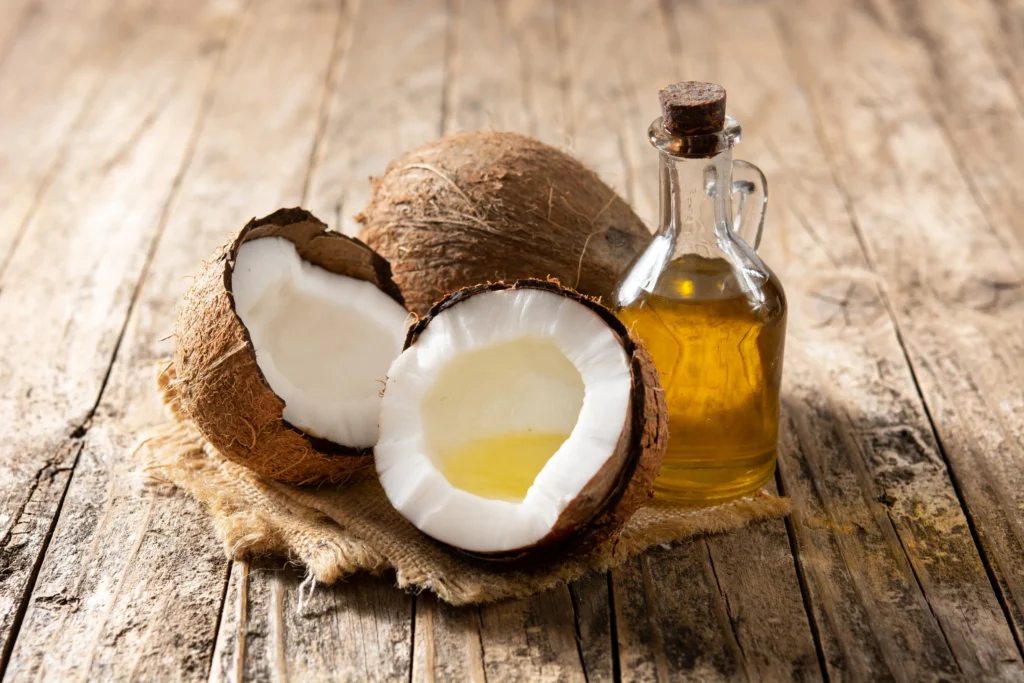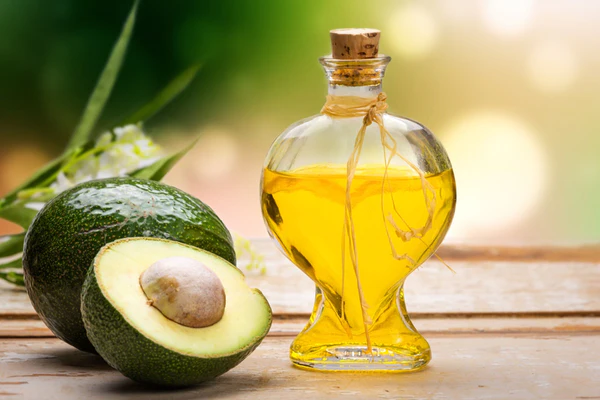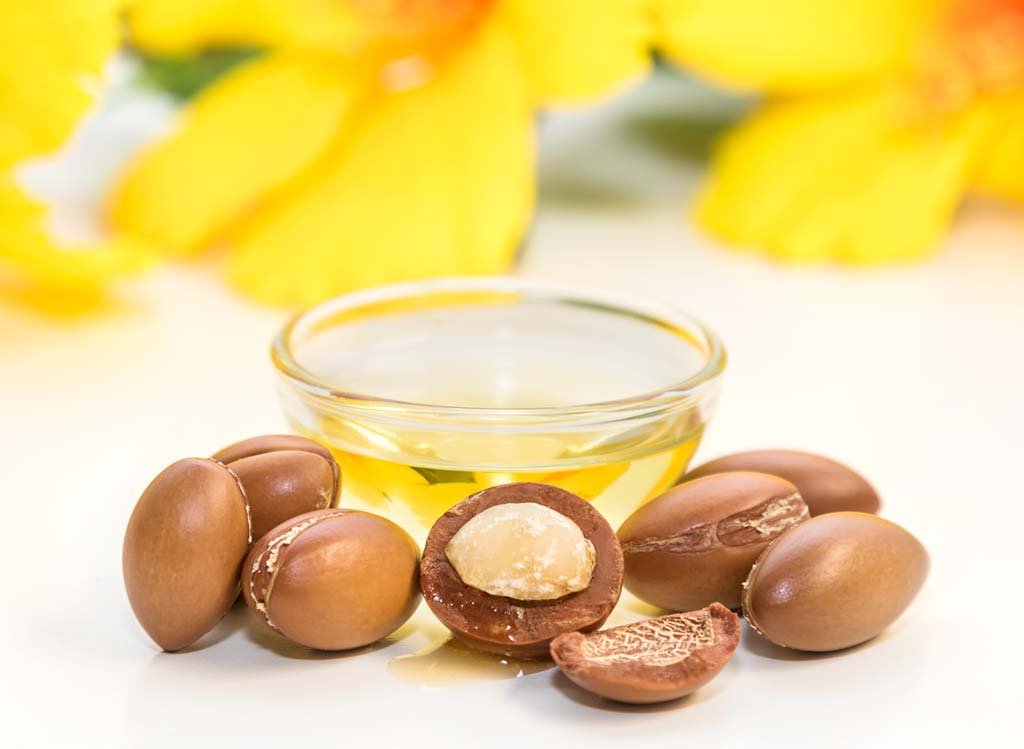No products in the cart.
Contents
Selecting the optimal carrier oil to accompany essential oils can prove to be quite overwhelming, particularly given the myriad of choices on the market. Although there is no universal solution, having a grasp of the characteristics and advantages of various carrier oils can assist you in making a well-informed choice.
Elements such as how quickly the oil is absorbed, its thickness, scent, and compatibility with skin all play essential roles in determining the most appropriate carrier oil for your specific requirements. In the following article, we will examine a best of carrier oils information to aid you in discovering the ideal complement for your essential oil blends.
A carrier oil is a vital component in the world of aromatherapy and skincare, serving as the base to dilute powerful essential oils before they are applied to the skin. Unlike essential oils, which are highly concentrated and can cause irritation if used directly, carrier oils are mild and are used to safely carry the essential oils onto the skin. These oils are made from the fatty portions of plants, often from the seeds, nuts, or kernels.
For example, jojoba oil is a popular seed oil extracted from the seed of the jojoba plant, making it a favorite carrier oil to use due to its moisturizing properties and long shelf life. Carrier oils can vary greatly, from regular coconut oil to unrefined coconut oil, and each type of carrier oil has its own benefits and uses.
When choosing a carrier oil, it’s important to consider the purpose of the application, as well as any personal preferences or skin sensitivities. Virgin olive oil, for example, is a great oil to use for those looking for a thicker, more nourishing oil. On the other hand, use jojoba oil as a carrier oil for its lighter texture and ability to closely mimic the skin’s natural oils, making it a perfect carrier oil for facial applications.
The process typically involves adding a few drops of essential oil to a tablespoon of carrier oil, creating a blend that is safe to use essential oils safely through applying essential oils topically.
When embarking on the journey of using essential oils, it’s crucial to understand the role and importance of a carrier oil. An effective carrier oil not only dilutes essential oils to make them safe for skin application but also enhances absorption, ensuring the therapeutic properties of the essential oils are effectively utilized. This guide provides in-depth insights into selecting the best carrier oil for your needs, considering various factors such as absorption rates, scent, and skin type compatibility.
Carrier oils, also known as base oils or vegetable oils, are used to dilute essential oils before they are applied to the skin. This is critical because essential oils are highly concentrated and can cause irritation or adverse reactions if applied directly. Carrier oils are derived from the fatty portion of a plant, usually from the seeds, kernels, or the nuts.
Selecting a carrier oil with a high absorption rate is crucial for maximizing the benefits of essential oils. Oils like jojoba, sweet almond, and grapeseed are known for their excellent absorption, making them ideal choices. These oils ensure that the essential oils penetrate deeply into the skin, providing maximum therapeutic benefits. Additionally, a great carrier oil will hydrate and nourish the skin without leaving a greasy residue, making it perfect for everyday use.
Moreover, oils such as fractionated coconut oil and avocado oil are celebrated for their high absorption rates and compatibility with various skin types, including sensitive skin. They are loaded with essential fatty acids and vitamins that promote skin health while ensuring the essential oils are fully absorbed.
These carrier oils are an excellent choice for those looking to experience the full spectrum of benefits offered by essential oils. Their non-greasy texture and ability to deeply moisturize the skin while enhancing essential oil absorption make them indispensable in any essential oil blend.
The processing method of a carrier oil significantly affects its quality and efficacy. Cold-pressed oils, such as virgin coconut oil and sweet almond oil, retain more nutrients and are considered superior in quality. These extraction methods ensure the carrier oils maintain their natural properties, offering better health benefits when used with essential oils. It’s essential to choose carrier oils that have undergone minimal processing to benefit from their natural, healing properties fully.
Unrefined or cold-pressed carrier oils are highly recommended for therapeutic use. These oils, including popular choices like jojoba oil and argan oil, preserve their potent antioxidants and essential fatty acids, making them more effective when mixed with essential oils. The method of extraction plays a pivotal role in determining the nutrient content and purity of the carrier oil, thus influencing its ability to dilute and enhance the performance of essential oils. Opting for cold-pressed, unrefined oils ensures the carrier oil retains its full spectrum of health benefits, making your essential oil blend more potent and beneficial.
When choosing a carrier oil, it’s critical to avoid mineral oils at all costs. Mineral oils are derived from petroleum and can clog pores, leading to skin issues. They also lack the nutritional value found in natural vegetable oils and can hinder the therapeutic effects of essential oils. For a healthy, effective, and nourishing blend, stick to natural carrier oils like jojoba, rosehip, or sweet almond oil. These oils offer a myriad of health benefits and ensure your skin can breathe and absorb the essential oils properly.
Mineral oils, although common in many cosmetic products, are not suitable for use as carrier oils with essential oils. They fail to provide the necessary nourishment and can even obstruct the beneficial properties of essential oils from reaching the skin effectively. In contrast, natural carrier oils such as avocado oil, jojoba oil, and sweet almond oil are packed with vitamins, antioxidants, and essential fatty acids that support skin health. These natural oils enhance the effectiveness of essential oils, ensuring the blend is not only safe but also beneficial for your skin.
When selecting a carrier oil, consider the specific use case—whether it’s for facial care, body massage, or treating specific skin conditions. For example, jojoba oil, with its similar composition to the skin’s natural sebum, is perfect for facial blends. In contrast, for a body massage, a thicker oil like sweet almond or coconut oil might be preferred due to their slip and extended massage time. Each carrier oil offers unique properties that can be matched to specific needs and preferences, enhancing the therapeutic benefits of the essential oils used.
The variety of available carrier oils allows for customization according to individual skin types and therapeutic needs. For instance, if you’re looking to treat dry skin, avocado oil, rich in vitamins A, D, and E, could be your best choice. On the other hand, for users with oily or acne-prone skin, using a light oil like grapeseed as a carrier can help manage sebum production while delivering the benefits of essential oils. Understanding the specific qualities of each carrier oil ensures that your essential oil blends are both effective and tailored to your unique requirements.
When opting for a carrier oil, the source of the oil is equally important as its type. Oils sourced from organic, non-GMO plants are free from harmful pesticides and chemicals, offering a purer, more natural option for your essential oil blends. High-quality sourcing ensures that the carrier oil retains its beneficial properties, enhancing the overall efficacy of your essential oil applications. Always aim for transparency in sourcing when selecting a carrier oil to ensure you’re getting the best quality available.
Furthermore, ethically sourced carrier oils not only guarantee a higher quality of oil but also support sustainable and fair-trade practices. This ensures that the communities involved in the production of oils, such as argan or rosehip, are fairly compensated and that environmental standards are upheld.
By choosing carrier oils that are ethically and organically sourced, you contribute to a more sustainable and responsible practice in the essential oils industry. This conscientious approach ensures that the carrier oils you use are not only beneficial for your health but also for the planet and its inhabitants.
The scent of a carrier oil can greatly influence the final aroma of your essential oil blend. While some carrier oils are almost odorless, like fractionated coconut oil or grapeseed oil, others, such as virgin coconut oil and olive oil, have a stronger scent that can overpower or alter the fragrance of essential oils. It’s important to consider how the scent of the carrier oil complements or affects the therapeutic qualities and aroma of the essential oil blend you are creating.
For applications where the natural fragrance of essential oils is paramount, selecting a carrier oil with a mild or neutral scent is crucial. This ensures that the therapeutic aroma of the essential oils remains unaltered and can exert its full effect. Carrier oils like jojoba oil and sweet almond oil are excellent choices for aromatic uses due to their subtle scents, which do not interfere with the essential oils’ fragrances. By carefully selecting a carrier oil based on its scent, you can create more effective and enjoyable essential oil blends for various applications.
Choosing the right carrier oil involves a balance of several factors, including the oil’s absorption rate, its compatibility with your skin type, and its nutrient profile. It’s also important to consider the oil’s scent and how it will blend with the essential oils you plan to use. For instance, if you’re using essential oils for their therapeutic aromas, you might opt for a carrier oil with a neutral scent, like jojoba oil.
Additionally, the use case—whether it’s for facial application, body massage, or hair treatment—will guide your choice of carrier oil. By considering these elements, you can select a carrier oil that enhances the effectiveness of your essential oil blends.
Beyond the immediate considerations of scent and skin compatibility, it’s also worth contemplating the carrier oil’s shelf life and how it’s processed. Carrier oils with longer shelf lives, such as jojoba oil or fractionated coconut oil, are often more convenient and economical choices. The processing method, whether cold-pressed, expeller-pressed, or solvent-extracted, can also impact the oil’s nutrient profile and purity.
Prioritizing cold-pressed oils ensures that you’re getting a carrier oil that retains the maximum amount of its natural benefits. In sum, by factoring in these various considerations, you can choose a carrier oil that not only complements your essential oils but also aligns with your health and wellness goals.
For skincare, the best carrier oils are those that are non-comedogenic and offer hydrating and nourishing properties. Jojoba oil, argan oil, and rosehip oil are among the top choices due to their light texture and compatibility with different skin types. Jojoba oil is particularly valued for its similarity to human sebum, making it suitable for both dry and oily skin. Argan and rosehip oils are rich in essential fatty acids and antioxidants, promoting skin repair and protection. These oils can be used alone or in combination with essential oils to create effective skincare blends.
In addition to their hydrating and nourishing properties, many carrier oils also offer specific benefits for the skin. For instance, sweet almond oil is renowned for its ability to soothe dry skin and improve skin tone, while avocado oil is highly moisturizing and rich in vitamins that support skin health. Coconut oil is another excellent option for skin care, especially for those with dry skin, due to its substantial moisturizing properties.
When selecting a carrier oil for skin care, it’s crucial to consider the oil’s nutrient content, absorption rate, and how well it matches your skin type and concerns. By doing so, you can enhance the beneficial effects of essential oils and create a skincare routine that is both nourishing and therapeutic.
When it comes to massage, the best carrier oils are those that provide the perfect slip, allowing hands to glide over the skin smoothly, while also offering nourishing benefits. Sweet almond oil, fractionated coconut oil, and jojoba oil are highly regarded for their excellent glide, making them ideal for massage treatments.
Sweet almond oil is particularly popular due to its slightly thicker consistency and ability to hydrate the skin deeply. Fractionated coconut oil, with its light texture and moisturizing properties, is another favorite for massage therapists and enthusiasts alike.
Additionally, avocado oil, with its rich, velvety texture, makes for an indulgent massage experience, providing deep hydration and nourishment to the skin. It’s particularly suitable for those with dry skin or for use in treatments focusing on relaxation and moisturizing. Jojoba oil, known for its long-lasting glide and compatibility with all skin types, is an excellent choice for a wide range of massage techniques.
Selecting a carrier oil for massage not only depends on its texture and nourishing properties but also on its ability to enhance the relaxing and therapeutic benefits of the essential oils used in the massage blend. By carefully choosing a carrier oil that meets these criteria, you can ensure a more effective and enjoyable massage experience.
There are many different carrier oils to choose from, each with its own unique properties and benefits. Whether you’re looking to dilute the essential oil with something like geranium essential oil for a soothing skin treatment or searching for an oil high in vitamins for added skin nourishment, there’s a carrier oil out there for every need. Some enthusiasts may find unrefined coconut oil as their favorite carrier oil due to its scent and moisturizing benefits, while others may lean towards a more neutral oil like regular coconut oil or jojoba oil.

Coconut oil is a versatile and popular carrier oil, loved for its moisturizing properties and light, sweet scent. Ideal for both skin and hair care, it’s particularly beneficial for dry, dehydrated skin or brittle hair. The oil’s ability to penetrate deeply into the skin makes it a great choice for nourishing treatments. Whether in its virgin or fractionated form, coconut oil serves as an excellent base for diluting essential oils, enhancing their absorption and efficacy.
The high content of fatty acids in coconut oil provides intense hydration and protective benefits, making it an excellent choice for repairing damaged skin and hair. Its antibacterial and antifungal properties further contribute to its popularity in skincare and haircare routines. Coconut oil’s compatibility with a wide range of essential oils allows for the creation of diverse therapeutic blends. Whether used for a soothing massage, as a moisturizing body oil, or as part of a hair treatment, coconut oil is a versatile and cherished carrier oil in the world of natural health and beauty.

Jojoba oil, with its unique similarity to the skin’s natural sebum, is a top choice for facial and body care. It’s particularly effective for both moisturizing and balancing oil production, making it suitable for all skin types, including oily and acne-prone skin. Jojoba oil’s anti-inflammatory and healing properties further enhance its value as a carrier oil. It works excellently with essential oils, providing a stable base that enhances skin absorption and therapeutic benefits.
Additionally, jojoba oil is renowned for its ability to promote healthy skin and hair. Its versatility allows it to be used in a variety of skincare and haircare products, including moisturizers, serums, and conditioners. The oil’s gentle nature makes it suitable for sensitive skin, while its antioxidant content helps to protect the skin from environmental stressors. When used as a carrier oil, jojoba oil ensures that essential oils are delivered to the skin in a gentle and effective manner, making it a valuable component of any natural health and beauty regimen.

Sweet almond oil is a gentle, nourishing oil suitable for all skin types, especially dry and sensitive skin. Rich in vitamins E and A, it helps to heal and protect the skin, making it a popular choice for soothing and moisturizing formulations. Almond oil’s mild, nutty scent makes it a pleasant base for essential oil blends, promoting skin hydration without overpowering the senses. Its versatility extends to hair care, where it can be used to add shine and softness.
Not only does almond oil serve as an excellent moisturizer, but its anti-inflammatory properties also make it an ideal choice for calming irritated skin. The oil can help improve skin complexion and tone, and its lightweight texture ensures that it penetrates the skin easily, delivering essential nutrients. Almond oil’s compatibility with essential oils enhances its utility, allowing it to serve as a carrier oil for a wide range of therapeutic blends. Whether used in massage oil formulations or as a part of daily skincare routines, almond oil helps to convey the benefits of essential oils while providing its own skin-soothing benefits.

Avocado oil is a deep-moisturizing carrier oil rich in vitamins A, D, and E, making it an excellent choice for nourishing and repairing the skin. Its thick, luxurious texture is perfect for creating rich, emollient blends for dry or mature skin. Avocado oil’s regenerative properties help to improve skin elasticity and promote soft, supple skin. It serves as an effective base for essential oil dilution, enhancing the therapeutic effects of the blend.
With its high content of essential fatty acids, avocado oil is not only beneficial for skin care but also for hair treatments, offering deep conditioning and strengthening effects. Its ability to penetrate the skin deeply ensures that the essential oils it carries are effectively absorbed, maximizing their healing properties. Avocado oil’s rich, nourishing qualities make it a valuable carrier oil for those looking to create moisturizing and restorative essential oil blends. Whether used for face serums, body butters, or hair masks, avocado oil enhances the efficacy and richness of natural beauty formulations.

Olive oil, a staple in both cooking and cosmetic use, is a highly nourishing carrier oil packed with antioxidants and vitamins. Its rich texture and moisturizing properties make it suitable for treating dry skin conditions and for use in hair care applications. Olive oil can be mixed with essential oils to create body oils, balms, and other therapeutic products, leveraging its hydrating benefits. However, its distinct scent may influence the final aroma of the blend, so it should be chosen with this consideration in mind.
Beyond its hydrating capabilities, olive oil has been traditionally valued for its ability to improve skin elasticity and protect against environmental damage. The oil’s antioxidant composition, including vitamin E, helps to neutralize free radicals and prevent premature aging. Olive oil’s compatibility with a variety of essential oils allows for the creation of multifaceted therapeutic blends aimed at addressing a wide range of skin and hair concerns. Whether employed as a massage oil, moisturizer, or hair treatment, olive oil acts as a potent carrier oil that nourishes and revitalizes from the inside out.

Argan oil, often referred to as “liquid gold,” is prized for its anti-aging and moisturizing properties. Rich in vitamin E and essential fatty acids, it’s especially beneficial for the skin and hair, offering hydration, nourishment, and protection. Its lightweight and non-greasy texture make it an excellent carrier oil for essential oils, enhancing absorption and providing a luxurious feel. Argan oil is particularly favored for facial care blends, where its regenerative and protective benefits can be most appreciated.
Aside from its hydrating and nourishing effects, argan oil also possesses properties that make it beneficial for acne-prone and oily skin types. Its ability to regulate sebum production helps to maintain a balanced and healthy complexion. Argan oil’s compatibility with a wide range of essential oils allows for the creation of personalized skin and hair care formulations that address specific concerns. Whether used as a standalone beauty treatment or as a carrier oil for essential oils, argan oil delivers a host of benefits that support skin and hair health, making it a versatile and valuable addition to any natural beauty routine.

Arnica oil, derived from the flowers of the arnica plant, is renowned for its anti-inflammatory and pain-relieving properties. It’s a preferred choice for therapeutic massage blends, especially for treating bruises, strains, and muscle soreness. When used as a carrier oil for essential oils, arnica oil can enhance the analgesic and anti-inflammatory effects of the blend, providing targeted relief and support for muscular and joint discomfort.
The healing properties of arnica oil extend beyond its pain-relieving effects, as it also helps to reduce swelling and improve circulation. Its ability to absorb quickly into the skin without leaving a sticky residue makes it an excellent carrier oil for both therapeutic and cosmetic applications. When paired with essential oils known for their soothing and healing properties, arnica oil creates powerful blends that aid in recovery from physical stress and injuries. Its specific benefits make arnica oil a unique and valuable carrier oil within the realm of natural health and wellness practices.

Being classified as a dry oil, rosehip oil absorbs swiftly into the skin without leaving behind any greasy residue. Hence, it is most suitable for individuals with normal to dry skin types. Rosehip oil can be used on its own as a natural moisturizer or mixed with essential oils as a carrier oil, such as in the creation of my lavender and rose water toner. Just like other popular carrier oils, rosehip oil contains essential fatty acids that support the regeneration of cells and tissues.
With high levels of vitamin C, rosehip oil also has anti-aging properties when applied topically. Research indicates that it is commonly utilized to diminish age spots caused by sun damage, enhance skin texture and tone, alleviate eczema, and combat skin infections
Carrier oils are used to dilute essential oils before applying them to the skin. Carrier oils are used in aromatherapy, massage therapy, and other natural remedies. When using essential oils, it’s important to always use a carrier oil to prevent irritation or sensitivity. One of the best carrier oils is olive oil as it is high in antioxidants and is easily absorbed into the skin. Another great choice is sweet almond oil, known for its anti-aging properties.
When mixing the essential oil with a carrier oil, make sure to do a patch test first to check for any allergic reactions. Each essential oil has its own unique properties, so it’s important to choose the right carrier oil for your needs. Carrier oils make a great addition to your skincare routine and can enhance the benefits of essential oils.
Carrier oils and essential oils go hand in hand when it comes to creating aromatic blends for skincare and massage. A carrier oil such as olive oil may be the perfect base for mixing with the potent aroma of essential oils. Olive oil is high in antioxidants and is a great choice for anti-aging benefits, making it a good carrier for essential oils. Another popular carrier oil is sweet almond oil, best known for its anti-aging properties.
This versatile oil is ideal for use in skincare products and massage therapies. Essential oils such as fruity aroma oils will help to balance out the potent scent of the essential oils. When creating blends, you’ll need to mix the essential oil with a carrier oil to dilute its intensity and allow for proper absorption into the skin.
Essential oil and carrier oil are both popular ingredients in aromatherapy and skincare products, but they serve different purposes. Essential oil is extracted from plants through methods like distillation or cold pressing, and it is highly concentrated with the natural essence and aroma of the plant. This type of oil is a great choice for adding fragrance and therapeutic benefits to products like candles, soaps, and lotions.
On the other hand, carrier oil is a less potent, fatty oil that is used to dilute essential oil and make it safe for topical use. Carrier oil may be used in skincare products, hair treatments, and more, and it helps to ensure that the essential oil is properly absorbed into the skin without causing irritation. Common examples of carrier oil include olive oil or almond oil, with almond oil as one of the most popular options due to its light texture and neutral scent.
Olive oil as a carrier is a popular choice when creating therapeutic blends with essential oils. It is rich in antioxidants and has hydrating properties that can nourish the skin. Sweet almond oil is one of the most commonly used carrier oils as well. It is lightweight and easily absorbed, making it a great choice for all skin types.
When combining carrier oil with a fruity aroma with essential oils, you can create a delightful and invigorating blend. For example, mixing sweet almond oil with essential oils like orange or grapefruit can create a refreshing and uplifting scent. This combination can be used in a diffuser, as a body oil, or in a massage to promote relaxation.
Using a carrier oil is also important when applying essential oils directly to the skin. Essential oils are highly concentrated and can cause skin irritation if applied undiluted. By mixing them with a carrier oil, you can safely enjoy the benefits of oil and massage without any negative side effects. Plus, the carrier oil will help to spread the essential oils evenly over the skin.
Carrier Oil is great for diluting essential oils, as it helps to evenly distribute the potent oils and reduce the risk of skin irritation. When diluting essential oils, it’s important to remember to always use a carrier oil such as coconut oil, almond oil, or jojoba oil. These oils help to safely dilute the essential oils and make them suitable for topical use.
Another important tip for safe dilution and mixing is to always use the recommended dilution ratios. Essential oils are highly concentrated and can cause skin irritation or sensitivities if not properly diluted. The general rule of thumb is to use 1-2 drops of essential oil per teaspoon of carrier oil for adults, and even less for children or those with sensitive skin.
It’s also a good idea to perform a patch test before using any diluted essential oil on a larger area of the skin. This can help to determine if you have any sensitivities or allergies to the oil, and prevent any adverse reactions. Additionally, always store your diluted oils in dark glass bottles away from heat and sunlight to preserve their potency and avoid any degradation of the oils.
By following these tips for safe dilution and mixing, you can enjoy the benefits of essential oils without any negative side effects. Remember to always prioritize safety when using essential oils, and consult with a healthcare professional if you have any concerns or questions.
Carrier oils are essential ingredients in any skincare routine, as they provide a multitude of benefits for the skin. One of the most absorbing carrier oils is sweet almond oil. This light and non-greasy oil easily penetrates the skin, delivering nutrients and hydration deep into the dermal layers. Its high content of vitamins E and A helps to nourish and repair the skin, making it an ideal choice for those with dry or sensitive skin.
Additionally, sweet almond oil is known for its anti-inflammatory properties, which can help reduce redness and irritation. It also has a mild, nutty scent that is pleasing to the senses, making it a popular choice for aromatherapy blends. Whether used on its own or mixed with other oils, sweet almond oil is a versatile and highly effective carrier oil that is sure to enhance any skincare routine.
When choosing a carrier oil, it is important to consider factors such as absorption rate, skin type, and desired benefits. Sweet almond oil stands out as one of the most absorbing carrier oils, making it an excellent choice for those looking to deeply nourish and hydrate their skin.
Fragrance oils are concentrated synthetic oils that are used to add scent to various products such as candles, soaps, and lotions. When it comes to mixing fragrance oils, they need to be diluted with other substances to ensure that they are safe and effective. One common substance that fragrance oils are mixed with is carrier oils. Carrier oils are typically plant-based oils that help to dilute the fragrance oil and provide a base for the scent.
Popular carrier oils include sweet almond oil, coconut oil, and jojoba oil. These carrier oils help to carry the fragrance oil onto the skin or other surfaces without being overpowering. In addition to carrier oils, fragrance oils can also be mixed with alcohol or water-based substances to create room sprays or linen sprays. This allows the scent to be dispersed more easily in the air and on fabrics.
Fragrance oils can be mixed with a variety of different substances to create your own unique scents. One popular option is to mix them with carrier oils such as sweet almond oil, jojoba oil, or coconut oil. These carrier oils help to dilute the fragrance oil and make it safe to use on your skin. Another option is to mix fragrance oils with alcohol, such as vodka or perfumer’s alcohol. This creates a light, refreshing scent that can be used in sprays and perfumes.
You can also mix fragrance oils with water to create your own room sprays or linen sprays. Simply combine the fragrance oil with water in a spray bottle and shake well before each use. No matter what you choose to mix your fragrance oils with, the possibilities are endless. Get creative and experiment with different combinations to find the perfect scent for you.
When it comes to choosing a carrier oil that penetrates the skin effectively, there is one standout option that reigns supreme – fractionated coconut oil. This lightweight and non-greasy oil is known for its ability to deeply penetrate the skin, delivering moisture and nutrients where they are needed most. Whether you have dry, sensitive, or aging skin, fractionated coconut oil is the perfect choice to nourish and rejuvenate your complexion from within.
Say goodbye to dull and dehydrated skin with the powerful hydration and nourishment provided by fractionated coconut oil. Unlike other carrier oils that may sit on the surface of the skin, this miraculous oil is easily absorbed, leaving your skin looking and feeling refreshed, revitalized, and radiant. Incorporate fractionated coconut oil into your skincare routine and prepare to be amazed by the transformative results.
Don’t settle for less when it comes to your skin. Choose a carrier oil that not only hydrates but also penetrates deeply to provide lasting benefits. With fractionated coconut oil, you can trust that your skin will receive the nourishment it craves, leaving you with a healthy and glowing complexion that you can feel confident in. Make the switch to fractionated coconut oil today and experience the difference for yourself.
Carrier oils are a vital part of any skincare routine, providing much-needed hydration and nourishment to the skin. When it comes to choosing the most hydrating carrier oils, there are a few standout options that never fail to deliver. One of the top choices is sweet almond oil, known for its ability to deeply moisturize the skin without leaving a greasy residue. Another excellent option is jojoba oil, which closely resembles the skin’s natural oils and is easily absorbed, making it perfect for all skin types.
For those with dry or mature skin, argan oil is a fantastic choice, packed with essential fatty acids and antioxidants to rejuvenate and hydrate the skin. Lastly, rosehip oil is a powerhouse of hydration, filled with vitamins and antioxidants to leave your skin glowing and youthful. Incorporating any of these hydrating carrier oils into your skincare routine is sure to leave your skin looking and feeling its best.
Carrier oil is an essential component in many beauty and skincare products, providing numerous benefits for the skin and hair. When selecting a carrier oil, it’s important to consider its texture and how greasy it may feel on the skin. If you’re looking for a carrier oil that is least greasy, consider opting for jojoba oil. Jojoba oil closely resembles the skin’s natural sebum, making it easily absorbed without leaving a greasy residue.
This makes it an ideal choice for those with oily or acne-prone skin, as it hydrates without clogging pores. Additionally, jojoba oil is rich in vitamins and minerals that promote healthy skin, making it a versatile and effective option for all skin types. Incorporating jojoba oil into your skincare routine can help nourish and protect your skin without the unwanted greasy feeling.
When it comes to choosing the best carrier oil for your essential oils bath, there are a few key factors to consider. First and foremost, you want to make sure that the carrier oil is gentle on your skin and won’t cause any irritation. Look for oils like coconut, jojoba, or sweet almond oil, as these are all known for their nourishing and moisturizing properties. Secondly, consider the scent of the carrier oil and how it will complement the essential oils you plan to use.
Some carrier oils, like grapeseed or argan oil, have a very mild scent that won’t overpower the aroma of your essential oils. Lastly, think about the consistency of the carrier oil. Oils like fractionated coconut or avocado oil are easily absorbed by the skin, making them perfect for a luxurious and relaxing bath experience. So do your research, experiment with different oils, and find the perfect carrier oil that will enhance the benefits of your essential oils bath.
This is a question that many people wonder about, especially those who are looking for natural remedies to alleviate the symptoms of a hangover. While there is limited scientific evidence to support the use of essential oils for hangovers, some people believe that certain oils can be helpful in reducing nausea, headaches, and fatigue associated with excessive alcohol consumption. However, it is important to note that essential oils should not be used as a substitute for medical treatment or advice from a healthcare professional.
Some of the essential oils that are commonly recommended for hangovers include peppermint, lavender, and ginger. Peppermint oil is believed to help with nausea and headaches, while lavender oil may help to promote relaxation and reduce stress. Ginger oil is also thought to be beneficial for soothing upset stomachs and improving digestion. These oils can be used in a diffuser, applied topically, or mixed with a carrier oil and massaged onto the skin.
It is important to remember that essential oils are highly concentrated extracts from plants and should be used with caution. Before using any essential oil for hangovers, it is recommended to do a patch test to check for any allergic reactions. It is also a good idea to consult with a healthcare professional before using essential oils, especially if you have any underlying health conditions or are pregnant or nursing.
When it comes to aromatherapy and skincare, essential oil and carrier oil are two commonly used ingredients. However, it is important to understand the key differences between the two in order to use them effectively. Essential oils are highly concentrated plant extracts that contain the volatile compounds responsible for the fragrance and therapeutic properties of the plant.
These oils are typically used in very small amounts due to their potency. On the other hand, carrier oils are pressed from the fatty portions of plants such as seeds, nuts, or kernels. They are used to dilute essential oils and help carry them onto the skin. Carrier oils are much milder than essential oils and are often used as a base for mixing and blending different oils together.
One of the main differences between essential oils and carrier oils is their concentration levels. While essential oils are highly concentrated and potent, carrier oils are much milder and act as a base to dilute the essential oils for safe use on the skin. Another difference is their therapeutic properties.
Essential oils are used for their unique healing and aromatic properties, while carrier oils primarily serve as a vehicle to deliver the essential oils onto the skin. Understanding these differences is crucial for creating custom blends for aromatherapy or skincare routines.
Carrier oils are essential in diluting essential oils for use in aromatherapy and massage therapy. When it comes to choosing the most healing carrier oil, one must consider the unique properties and benefits of each oil. One of the most popular healing carrier oils is argan oil. It is known for its moisturizing and anti-aging properties, making it a great choice for skincare. Another excellent healing carrier oil is jojoba oil.
Jojoba oil closely resembles the natural oils produced by our skin, making it an ideal choice for all skin types. It is also known for its soothing and nourishing properties. Coconut oil is another healing carrier oil that is highly versatile. It is rich in antioxidants and can help improve the health of the skin and hair. Lastly, rosehip oil is a popular choice for its regenerative and healing properties. It is rich in vitamins and antioxidants, making it a great choice for addressing scars and fine lines.
When it comes to choosing the best carrier oil for massage, there are several factors to consider. Coconut oil is a popular choice due to its light texture, pleasant scent, and ability to easily penetrate the skin. It is rich in antioxidants and has antimicrobial properties, making it a great option for those with sensitive skin. Sweet almond oil is another top pick for massage as it is easily absorbed, rich in vitamins A and E, and has anti-inflammatory properties.
Jojoba oil is also a favorite among massage therapists for its long shelf life, non-greasy texture, and similarity to the skin’s natural oils. Lastly, grapeseed oil is a lightweight option that is easily absorbed and has a high concentration of antioxidants. Ultimately, the best carrier oil for massage will depend on your personal preferences and any skin sensitivities you may have.

